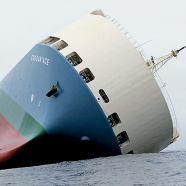Where is she going?
Press Release Modern Express no.2
The amended European Union Directive of June 27, 2002 asks all member States to establish plans to accomodate ships in distress in their ports or in any other protected area in the best possible conditions.
The Modern Express is currently under tow and is heading further out to sea. It is understandable that the French maritime authorities initially wish to keep her away from an inhospitable coastline.
Nevertheless, in order to avoid a shipwreck in the middle of the sea, or a potential sinking of the vessel in the Bay of Biscay, it is essential to designate a place of refuge where the salvage teams could benefit from better weather and technical conditions necessary to correct the list of the Modern Express. The vessel is currently in waters under French jurisdiction.
The solitary journey of the Modern Express
The scenario of the ship that refuses to sink is a familiar situation for rescue teams and maritime authorities since the Liberty Ship Flying Entreprise ran adrift in the English Channel in the winter of 1952. A notable difference with the Modern Express is that the master stayed on board till the very end, until he was evacuated, following 15 days of drift and futile efforts to restore the stability of the vessel.
Although relatively recently built, a number of deficiencies have been reported on the Modern Express in the Port of Antwerp since 2012.
Risks of Oil Spill in the North Sea
The death and disappearance of 11 sailors from the Baltic Ace car-carrier after colliding with the container ship Corvus J in the North Sea will be followed by an oil spill. After the tragic human casualties will follow environmental damage. The Baltic Ace wreck contains several tons of propulsion fuel oil and diesel oil. Each of the 1417 cars transported contain around 5 liters of fuel.
A similar accident that happened 10 years ago off Dunkirk had provoked oil sheens around the wreck, 2 days after the sinking of the Tricolor car-carrier. Two months later the assessment of the oiled birds was 5,200 in the north of France, 12,000 in Belgium, and 2,000 in the Netherlands. The coasts of Belgium, Flanders, Calaisis, Boulonnais, the Somme Bay and Normandy have been polluted by hydrocarbons released by the wreck. The nuclear plants in Penly in Normandy and in Gravelines in the north of France have been placed on alert because of the risk of hydrocarbons arriving in the cooling waters.
Today, it would be prudent if the Borssele nuclear plant in the Netherlands adopted the same procedures.
Somewhere between ‘Are you ready?” and “shhh!…The child’s asleep”.
The maritime prefect of the Mediterranean has chosen the right option: the first. They have deployed anti-pollution measures in Corsica to counter the possible arrival of oil from the Costa Concordia wreck. Italy has yet to do the same for Sardinia and the Elba. It is noted here and there that there are recommendations on the use of dispersants. In an environment as fragile and rich in biodiversity, this toxins product is not recommended.
Faced with soothing words from several stakeholders, Robin des Bois emphasises that pollutants and floating debris in the marine sub-region encircled by Italy and France can float hundreds of kilometres.
Somewhere between ‘Are you ready?” and “shhh!…The child’s asleep”.
The maritime prefect of the Mediterranean has chosen the right option: the first. They have deployed anti-pollution measures in Corsica to counter the possible arrival of oil from the Costa Concordia wreck. Italy has yet to do the same for Sardinia and the Elba. It is noted here and there that there are recommendations on the use of dispersants. In an environment as fragile and rich in biodiversity, this toxins product is not recommended.
Faced with soothing words from several stakeholders, Robin des Bois emphasises that pollutants and floating debris in the marine sub-region encircled by Italy and France can float hundreds of kilometres.










